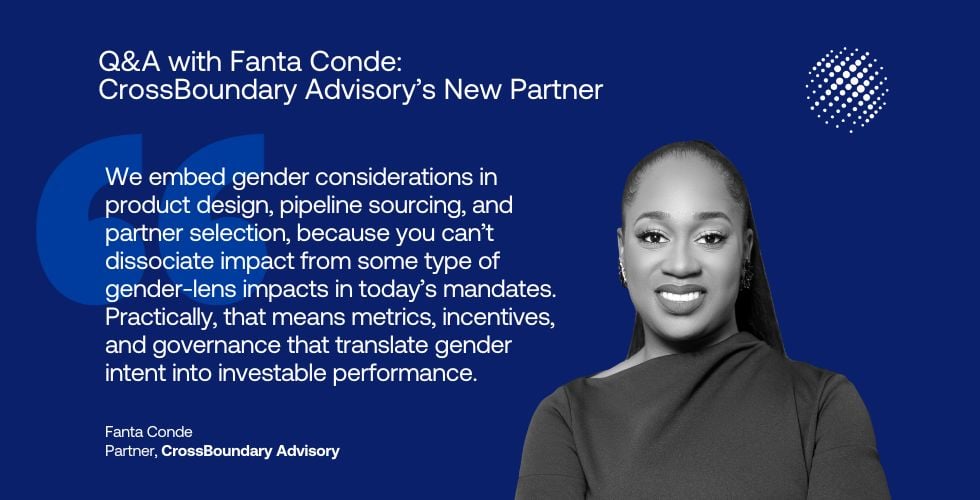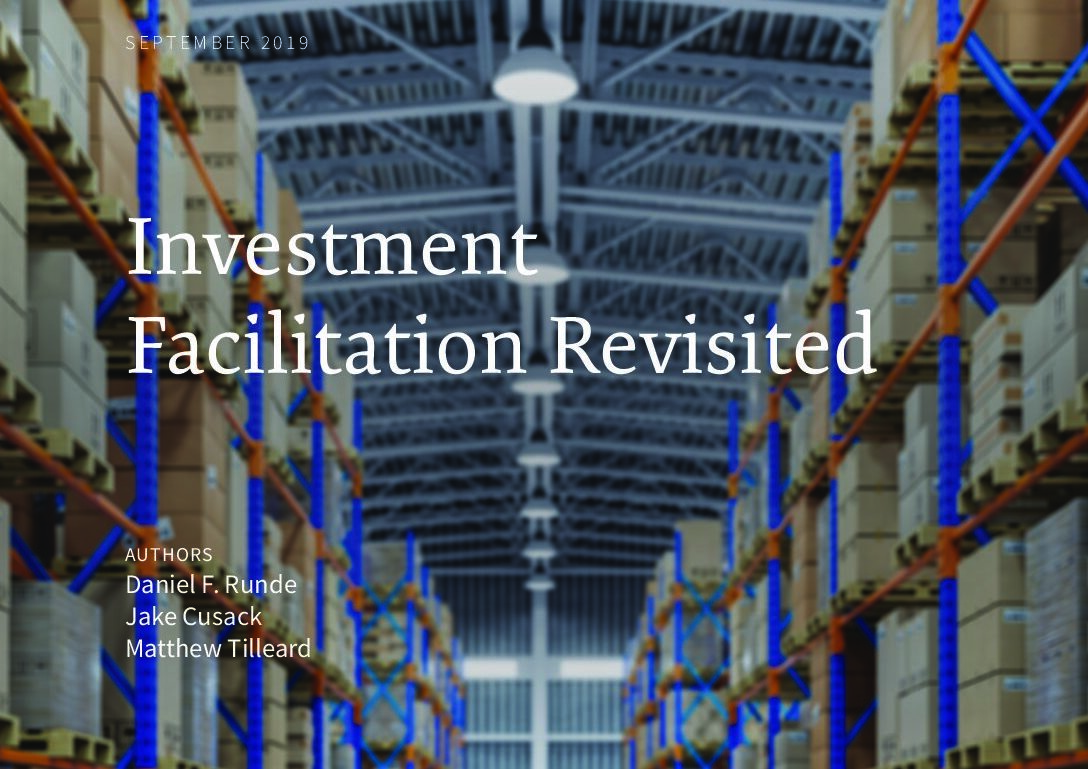
Q&A with Fanta Conde CrossBoundary Advisory’s New Partner
CrossBoundary Advisory recently announced three new partners to lead our growing investment advisory practice.
CrossBoundary Advisory recently announced three new partners to lead our growing investment advisory practice.
Fanta Conde, Kirtika Challa, and Jonathan Duarte will join Partners Jake Cusack, Thomas Flahive, and Paul Ouma in the leadership of CrossBoundary Advisory. Each new partner brings unique expertise and perspectives in the specific geographies and sectors they serve.
We asked Fanta Conde to reflect on her career and journey thus far and the opportunities she sees on the horizon for our clients, investors, and CrossBoundary Advisory as a firm.
Q: How has your approach to mentoring shaped your leadership style and contributed to CrossBoundary Advisory’s broader firm-building efforts?
Fanta: At the core of my leadership journey at CrossBoundary is a deep commitment to mentoring. I view mentorship not as a top-down transfer of knowledge, but as a two-way street—one that enables me to grow alongside my colleagues. I’ve invested significant time in getting to know team members beyond surface-level interactions, which has created meaningful connections that help surface both opportunities and challenges within the firm.
Through mentoring, I’ve often been the person others turn to when navigating delicate situations, and I’ve seen firsthand how these relationships can serve as powerful early warning systems and engines for cultural integrity. It’s made me a more effective leader and has shaped how I think about our internal structures and the kind of leaders we want to cultivate. I’m now exploring how to scale this mentoring ethos—without losing the personal connection that makes it so powerful—so it can be a more intentional part of firm culture. I believe mentoring is not just something I do; it’s a tool for firm building, leadership development, and institutional resilience.
Q: What unique investment opportunities do you see emerging in Africa that international investors might be overlooking?
Fanta: We’re seeing non-traditional players step in with catalytic capital, especially corporates under license-to-operate and supply-chain pressures (e.g. mining multinationals) and major philanthropies moving away from pure grants into fit-for-purpose blended vehicles. The opportunity is to translate that intent into bankable structures that stretch limited concessional dollars and crowd in commercial capital. Our edge is co-design: align incentives across private actors, DFIs, and local finance, then build instruments that address real frictions (FX, collateral, monitoring costs) so deals move.

Q: How has the private sector landscape in Africa evolved since you joined CrossBoundary in 2018, and what trends are you most excited about?
Fanta: Expectations have matured. The hype around PE/VC in Africa has deflated a bit where returns weren’t proven, and stakeholders now want partners who co-create solutions, not just execute playbooks. That’s opening space for comprehensive solutions – transaction support plus technical assistance, as well as ecosystem strengthening work – that deliver near-term results and measurable long-term outcomes. We’re leaning into this with clear KPIs and monitoring and evaluation (M&E) so capital providers can see traction and scale what works.
We treat funders as partners and design solutions from their objectives and constraints – so the solution is relevant and implementable. For the BRIDGE-in Agriculture program in Ghana, for example, bank consultations showed the high cost of monitoring was a main inhibitor of the success of guarantee mechanisms in the sector, so we built targeted features (e.g., loan-monitoring support; calibrated first-loss) to make on-lending viable without distorting incentives.
That co-creation approach, plus a clear view of our strong and diverse internal capabilities, helps us push the limits while still building platforms that work for local banks and enterprises. It’s a repeatable approach: clarify outcomes, map stakeholder constraints, and then structure blended instruments and delivery models that de-risk early and scale with market feedback.

Q: What role does gender analysis and programming play in unlocking private investment in West African markets, and how do you integrate this into your advisory work?
Fanta: It’s inevitable – many mandates require gender outcomes and community legitimacy to unlock capital. We embed gender considerations in product design, pipeline sourcing, and partner selection, because you can’t dissociate impact from some type of gender-lens impacts in today’s mandates. Practically, that means metrics, incentives, and governance that translate gender intent into investable performance.
Q: How do you approach blended finance structuring differently for African transactions compared to other emerging markets?
Fanta: We start with what each stakeholder can and can’t do – objectives, constraints, and willingness to pay – then tailor de-risking tools to local realities (FX exposure, policy shifts, capacity, etc.). On the supply side, corporates and philanthropies are actively exploring blended vehicles; on the demand side, we structure instruments that de-risk early and move projects toward fully commercial terms as performance is proven. This is exactly the kind of catalytic, market-building work CrossBoundary is known for.

Q: How has your design-thinking approach to business development changed the way CrossBoundary engages with both local companies and international capital providers?
Fanta: We position as partners in problem-solving – listening first, pressure-testing assumptions, and co-designing structures the market will actually adopt. That often means proposing a program architecture (not just a single instrument), with roles, data needs, and legal guardrails defined up front so delivery is real. This is no longer optional – clients don’t want service providers or advisors; they want partners who think with them and create truly bespoke solutions. We are that partner. It’s why we align incentives, bring the right internal experts to the table, and deliver offerings that are bespoke, bankable, and built to scale rather than one-off executions.
We position as partners in problem-solving – listening first, pressure-testing assumptions, and shaping a structure the market will actually adopt. That often means proposing a program architecture rather than a single instrument, with responsibilities and data needs defined up front. This approach treats clients as collaborators and partners. It requires a deep grasp of our own team’s capabilities so we can credibly deliver. The result: offerings that are bespoke, bankable, and built for scale rather than one-off execution.
Q: Looking ahead to 2026-2027, what policy or market developments do you expect will most significantly impact private investment flows into West Africa?
Fanta: The full implementation of the African Continental Free Trade Area (AfCFTA) will be a game-changer. Today, the lack of basic infrastructure is a burden, but regional integration can reduce costs and expand markets for SMEs. I also expect different types of players to take a stronger stance in providing catalytic funding as ecosystems mature, thus creating exponential spillovers in investability, jobs, and industry depth. Our role is to translate those shifts into bankable opportunities and scalable structures for our clients.



